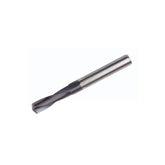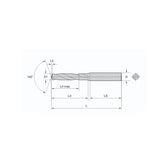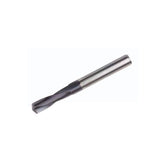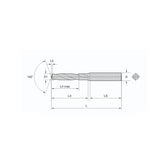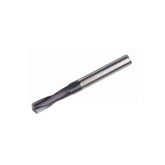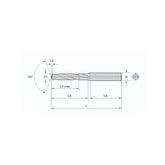Comprehensive Analysis of Cemented Carbide Drill Bits Performance
Unveiling the Performance of Carbide Drill Bits: Which Composition Combination Reigns Supreme?
1. Cobalt (Co) Content Impact
- Increased Co content enhances flexural strength and impact toughness
- YG4X (4% Co) shows 15% higher bending strength than YG3X (3% Co)
- Trade-off: Every 1% Co increase reduces hardness by ~50 HV30
2. Tungsten Carbide (WC) Grain Size Effects
-
Fine grains (<1μm):
- Hardness ↑ 10-15% (HV 1800→2000)
- Fracture resistance ↓ 20% with HIP treatment compensation
-
Coarse grains (2-5μm):
- Flexural strength ↑ 30% (2000→2600 MPa)
- Hardness ↓ 8-12%
3. Additive Elements Functionality
| Element | Effect | Performance Data |
|---|---|---|
| La (0.35%) | Strengthening effect | 590.8 MPa bending strength, 89 HRB |
| V/Cr | Grain refinement | Hardness-toughness balance optimization |
| Ni/Cu | Matrix reinforcement | 15-20% bending strength improvement |
4. Rigidity & Deformation Control
- Material stiffness: 2× higher than steel (550 vs 210 GPa)
-
Coating technology:
- TiN coating: Reduces friction coefficient by 25-30%
- TiAlN coating: Withstands 800℃ vs 600℃ for uncoated
- Structural design: Concentricity tolerance <0.005mm for precision bits
5. Performance Optimization Strategy
-
Contradiction resolution:
- HIP processing: ↑ Density to 99.9%, Pores ↓ 90%
- Ultra-fine grain (0.2-0.5μm) + 6-8% Co: Optimal balance
-
Application-specific solutions:
- High-Co (10-15%): Impact resistance for fractured rock
- Low-Co (3-6%) + HIP: Precision machining applications
Key Performance Matrix
| Parameter | Dominant Factors | Optimization Approach |
|---|---|---|
| Fracture resistance | High Co + Coarse WC | 12% Co + 4μm WC |
| Rigidity | Low Co + Fine WC | 6% Co + 0.8μm WC + TiAlN |
| Deformation control | HIP + La addition | HIP@1400℃/100MPa + 0.3% La |
Explore Our Carbide Drill Bits
Professional Grade Carbide Drill Bit Supplier | Technical Support Available
